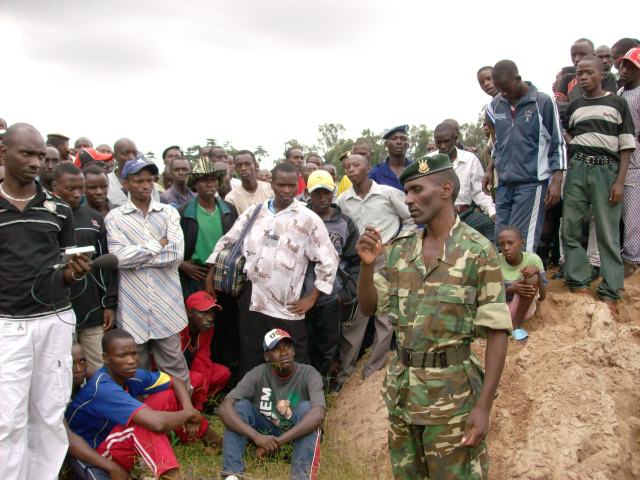“The situation is explosive,” Pierre Claver Mbonimpa, chairman of the Association for the Promotion of Human and Prisoner Rights (APRODH), told IRIN.
“Demobilised people [former members of now defunct armed groups] have become uncontrollable,” he said. (Read an IRIN story on the prevalence of weapons and political youth wings)
“Youths from the [ruling] CNDD-FDD party cause many problems in the country. But in reaction, the [opposition] FRODEBU youth has become very active. Judging by their name, Intakangwa, which means ‘those who cannot be frightened’, they are prepared to respond to any provocation,” said Mbonimpa.
Elections for councillors in Burundi’s 117 communes take place on 21 May. There is a presidential election on 28 June, a legislative poll on 23 July, and senators will be elected on 28 July. In September, Burundians will vote for heads of 2,639 “collines”, the country’s smallest administrative units.
“People are killed in their houses for unknown reasons,” according to François Bizimana, spokesman for the CNDD opposition party.
“When we organize meetings, the Imbonerakure break them up and beat our supporters,” he said, referring to the ruling party’s youth arm, whose name means “those with foresight”.
“Some of our supporters are arrested. How can people come to meetings under such conditions? How can people vote for our programme if we have no chance to explain it?” he asked.
“They used to sing war songs to intimidate our members, but they have now passed from threats to acts, killing our supporters here and there,” alleged Jean-Bosco Havyarimana, spokesman for the National Liberation Forces, one of several rebel groups turned political parties.
Destabilizing factor
Party youth wings are a “major destabilizing factor” in Burundi, Gertrude Kazoviyo, deputy president of the Observatory of Government Action, warned while presenting the annual report of the Forum of Civil Society Organizations in late February.
|
Photo: IRIN  |
| Alexis Sinduhije leader of the opposition Movement for Solidarity and Democracy (file photo) |
“I do not know if an arrest warrant has been issued, but they have not been prosecuted,” he told IRIN.
Ruling party spokesman Onesime Nduwimana dismissed the idea that politics or the elections were linked to recent killings in Burundi. Cases of one kind of manslaughter or another feature in newspapers on an almost daily basis. According to APRODH, in 2009 there were 411 killings in Burundi, a country of some eight million inhabitants.
“We have a history of conflicts of every kind, conflict over land… People can kill each other because of what they have gone through during the civil war. But there is a tendency to use some facts for political ends,” he said.
For Salathiere Muntunutwiwe, a political analyst and university lecturer, the prevailing climate imperils the whole electoral process.
“In the absence of the free exercise of political competition, people will not have the right to choose whoever they want. Coupled with the opposition parties’ mistrust of the government’s ability to organize free and fair elections, this could lead to the rejection of the election results,” he said.
Isolated cases
But as far as the ruling party chairman was concerned, by and large the situation was under control. “There are isolated cases in provinces where the administration is weak and not well organized, like Kirundo [in the north], or zones like Kinama, in the capital. However, those behind such acts are punished accordingly,” Nduwimana said.
 Photo: IRIN  |
| A map of Burundi (file photo) |
While discounting the likelihood of a return to full-scale war, Sinduhije, the once-jailed opposition leader, believes the instability is a deliberate ploy by the ruling party “to have its term extended or to force people to vote for it”.
A view echoed by FRODEBU’s chairman, Leonce Ngendakumana, who in late February accused elements of the police and army of “intimidating the population to force them to vote for the ruling party”.
Police neutrality questioned
The partisan nature of some in the security forces is in part due to the fact that many were drawn from former rebel groups integrated into state machinery after signing peace accords.
“In spite of the training, some elements of the national security forces have not yet [internalized] that they have to remain neutral during the electoral process,” explained Kazoviyo of the Observatory of Government Action.
In a February report on Burundi, Ensuring credible elections, the International Crisis Group also noted that “the police have remained passive or become accomplices to the ruling party abuses”.
“There are thus legitimate fears they could become politicized, similar to the national intelligence service, which is already trying to destabilize the opposition,” ICG warned, calling for neighbouring countries to provide a regional force to help train their Burundian counterparts and to support election security and monitoring.
Grievances over living conditions among the lower ranks are yet another cause for concern, after protests led to some arrests and sackings.
“There is serious mistrust between junior officers and commanders. A delegation of junior officers came and told me that if their claims were not met before the elections, the polling stations would be burned,” Mbonimpa, the human rights activist, told IRIN.
(The function of Onesime Nduwimana was corrected on 5 March 2010 to spokesman)
jb/am/mw
See also: BURUNDI: Activists decry rights abuses, culture of impunity
This article was produced by IRIN News while it was part of the United Nations Office for the Coordination of Humanitarian Affairs. Please send queries on copyright or liability to the UN. For more information: https://shop.un.org/rights-permissions




